 Petzlover
Petzlover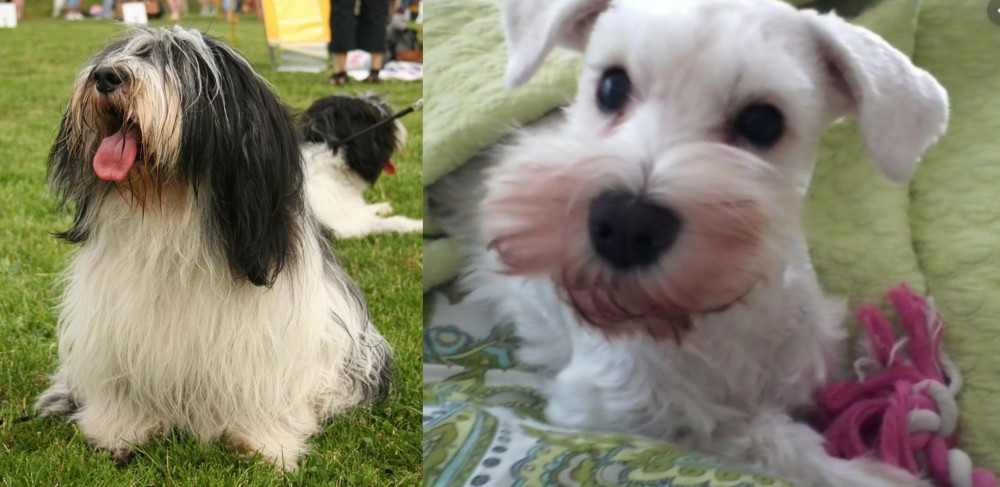 Polish Lowland Sheepdog is originated from Poland but White Schnauzer is originated from Germany. Polish Lowland Sheepdog may grow 14 cm / 6 inches higher than White Schnauzer. Polish Lowland Sheepdog may weigh 16 kg / 36 pounds more than White Schnauzer. Both Polish Lowland Sheepdog and White Schnauzer has almost same life span. Both Polish Lowland Sheepdog and White Schnauzer has same litter size. Both Polish Lowland Sheepdog and White Schnauzer requires Moderate Maintenance.
Polish Lowland Sheepdog is originated from Poland but White Schnauzer is originated from Germany. Polish Lowland Sheepdog may grow 14 cm / 6 inches higher than White Schnauzer. Polish Lowland Sheepdog may weigh 16 kg / 36 pounds more than White Schnauzer. Both Polish Lowland Sheepdog and White Schnauzer has almost same life span. Both Polish Lowland Sheepdog and White Schnauzer has same litter size. Both Polish Lowland Sheepdog and White Schnauzer requires Moderate Maintenance.
 Hailing from Poland, the Polish Lowland Sheepdog is believed to have descended from herding dogs as well as the Puli and Tibetan Terrier.
Hailing from Poland, the Polish Lowland Sheepdog is believed to have descended from herding dogs as well as the Puli and Tibetan Terrier.
Later these dogs were bred with local Scottish dogs to bring about Scottish herding dogs, the Bearded Collie. The dog was accepted by the Federation Cynologique Internationale in 1959. In 2001, the American Kennel Club recognized the Polish Lowland Sheepdog as a breed in the Herding Group.
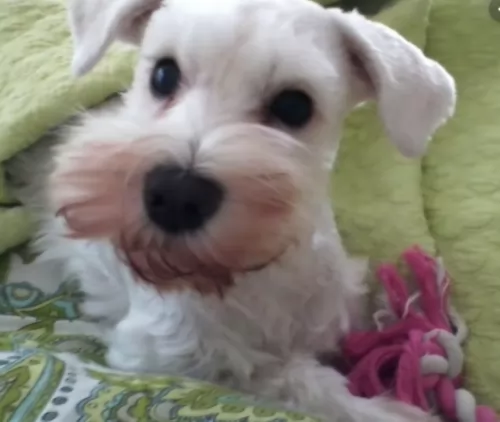 The White Schnauzer was established in Germany in 2006 for people looking for this particular breed of dog but in white.
The White Schnauzer was established in Germany in 2006 for people looking for this particular breed of dog but in white.
The traditional color is salt and pepper. It seems that breed societies don’t allow the white breed, saying they don’t conform to the ideal breed standard.
The White Schnauzer is officially recognized in Germany, If you have a White Schnauzer you may not be able to show him with some of the major kennel clubs.
White is one of the four color varieties of the Miniature Schnauzer and it is also recognized by the Fédération Cynologique Internationale.
 The Polish Lowland Sheepdog is a medium-sized dog. Both males and females stand between 42cm to 50 cm in height and they weigh roughly between 14 and 23kg.
The Polish Lowland Sheepdog is a medium-sized dog. Both males and females stand between 42cm to 50 cm in height and they weigh roughly between 14 and 23kg.
The dog has a double coat which can mostly be white, cream, gray, brown and black. The underdoat is soft and dense with the top coat being straight or wavy and being medium length.
There is quite a bit of hair around the facial area. The eyes are alert and brown and the ears medium size, high set and then drooping down. The tail has always been attractively docked, giving the dog an attractive, compact look but these days it is often just left long.
Lively, bright as a button, clever, social and feisty, the Polish Lowland Sheepdog is easy to train, becoming obedient and well balanced. The Polish Lowland Sheepdog is such a self confident dog and he will fit happily into life in the city or the countryside, loving spending time with his human family.
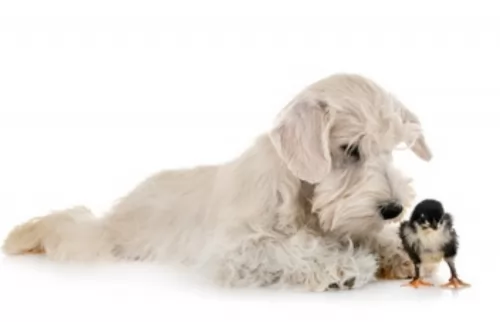 There are a number of different types of White Schnauzer. The white Schnauzer is actually one of 4 color varieties and these dogs are always miniature Schnauzers.
There are a number of different types of White Schnauzer. The white Schnauzer is actually one of 4 color varieties and these dogs are always miniature Schnauzers.
You won’t easily find a Standard- or Giant dog in white. They aren’t albinos, as the skin does have some pigment.
These dogs also have that square-shaped build and they stand between 28 to 36 cm in height and weigh between 4 and 7kg.
The coat is wiry with a soft undercoat. The ears are often cropped to stand erect, but if left they are half-erect, half-floppy and fold forward.
The White Schnauzer is an intelligent dog who will be able to be socialized and trained easily.
He is an energetic little dog and very playful and will get along well with children, loving the games they provide and loving to spend time with all members of his family.
He is loving and affectionate and is willing to share his home and people with other dogs too. He will make you a good watchdog, perhaps encouraged because of his reserve with strangers.
If you provide him with the right amount of mental and physical stimulation, he can become a balanced dog with an amicable personality.
 The PON is an independent, self-willed dog but he can also be entertaining and amusing. He is a social, friendly dog but for many people, his long hair and grooming requirement might prove to be a bit of a handful.
The PON is an independent, self-willed dog but he can also be entertaining and amusing. He is a social, friendly dog but for many people, his long hair and grooming requirement might prove to be a bit of a handful.
Your dog is energetic, cheerful and playful and when he isn’t around, it will be like some sunshine has gone out of your life. He is faithful and loving towards his human family but is aloof towards strangers. Bring one of these dogs into your home and you’re guaranteed to have a remarkable friend and pet for many years.
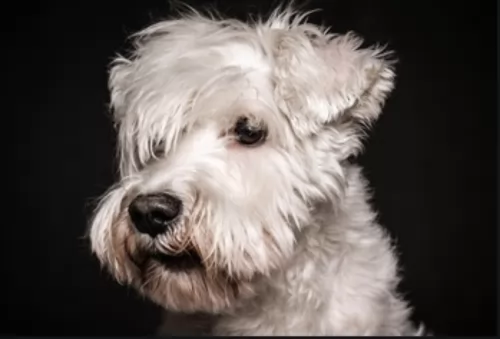 The White Schnauzer is such an adaptable little dog and he will happily adapt to life in the city or in the countryside, just so long as he is close to his human companions and gets sufficient exercise.
The White Schnauzer is such an adaptable little dog and he will happily adapt to life in the city or in the countryside, just so long as he is close to his human companions and gets sufficient exercise.
He is a sociable dog that just loves to be around his human family and won’t like to be separated from them for too long.
He makes a great family dog when you provide him with the right food, a warm dry place to sleep, exercise and lots of love and attention.
 These dogs are generally healthy and the dog’s life expectancy is about 12 years. Nonetheless there are some problems to be aware of. For instance, with this dog, hip dysplasia is a real problem.
These dogs are generally healthy and the dog’s life expectancy is about 12 years. Nonetheless there are some problems to be aware of. For instance, with this dog, hip dysplasia is a real problem.
The Orthopedic Foundation of America evaluated the hip X-rays of hundreds of these dogs and found a large percentage were dysplastic.
Hereditary eye disease can also occur with this dog. Macular degeneration is a common eye disorder that can cause central vision loss. Many genetic abnormalities can cause degeneration of the image forming part of the eye. Unfortunately these conditions can result in total blindness. Parts of the retina can also degenerate with age.
Skin allergies are also an ever present threat with your dog. Itchiness and pain can be a nightmare for your pet and scratching and licking brings no relief – just aggravates the condition. You will certainly need to get your pet to the vet as skin allergies and skin diseases can make your beloved canine miserable.
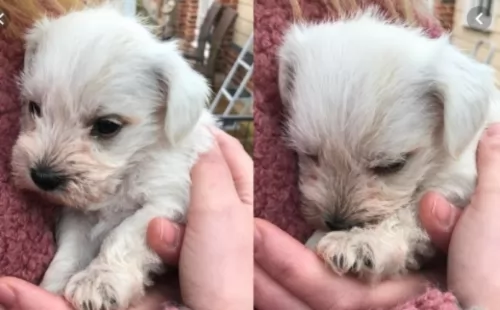 While he is a spunky, robust type of dog, there are always going to be some health concerns to look out for.
While he is a spunky, robust type of dog, there are always going to be some health concerns to look out for.
Kidney stones may well not cause your pet the same pain that humans endure, but they are still a cause for concern. A kidney stone that gets too large and lodges in the ureter becomes a ureterolith. This can be very painful, resulting in pain and even vomiting.
The kidney can even swell and become damaged. Your dog could become critically ill, particularly because of the disrupted flow of urine.
Your pet will possibly have blood in the urine, fever, lethargy, poor appetite and weight loss. Veterinary-intervention will be imperative.
 Your Polish Lowland Sheepdog is like a big Bear and his long, shaggy coat will require regular brushing, otherwise it could become full of burrs and grass.
Your Polish Lowland Sheepdog is like a big Bear and his long, shaggy coat will require regular brushing, otherwise it could become full of burrs and grass.
Many people prefer to take their dogs to a grooming parlor where the hair is cut, the nails trimmed, the teeth cleaned and the ears checked.
Provide your Sheepdog with a nice warm, dry cozy spot that is his and where he can quietly retreat.
If your Polish Lowland Sheepdog spends time outdoors, make sure he has access to both shade, sun and shelter in case it rains. There must always be a bowl of fresh water outdoors too.
It is better to give your adult Polish Lowland Sheepdog 2 smaller helpings of food as opposed to one big bowl. Puppies will need 4 bowls of food a day. Two bowls will ensure your dog doesn’t gobble up his food and create digestive problems and bloat.
High-quality dry dog food will provide a balanced diet, but you want to make it a little more delicious for him occasionally by mixing in chopped up boiled chicken, brown rice, sweet potatoes, carrots and spinach. Just a tad of raw meat occasionally can also be of huge benefit.
Fresh, cool water should always be available around the clock. Be sure to keep his food and water dishes clean.
Have your dogs spayed or neutered if you don’t want them to have puppies.
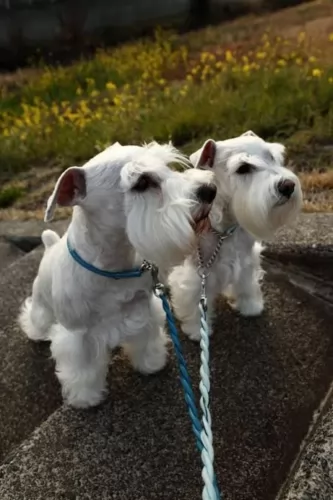 He is a low shedding breed so he will require a brushing just once a week. These dogs also have a certain professional grooming cut. Some schnauzer dog owners do stripping but this is mostly for show dogs.
He is a low shedding breed so he will require a brushing just once a week. These dogs also have a certain professional grooming cut. Some schnauzer dog owners do stripping but this is mostly for show dogs.
Most people just have them sheared to make it easy to groom them. Whether stripped or clipped, they nearly always have a beard and bushy eyebrows.
Trim your pet's nails and give him a general once-over during the grooming sessions to ensure all is well.
You White Schnauzer relies on you to make wise food choices for him. He will eat most things you offer him. That doesn’t mean you should as you can cause him to have a whole lot of digestive problems.
If you choose to give him commercially manufactured dog food, make sure its a high-quality one – devoid of toxic ingredients such as colorants, fillers and preservatives.
If you don’t know how to choose, your vet can show you the foods they have in stock and which would suit your pet best.
A little bit of home-made food now and then can also be good, but the food needs to be plain and simple to avoid abdominal pain. Boiled chicken brown rice and vegetables chopped up and added to the dry kibble occasionally can be a very good choice.